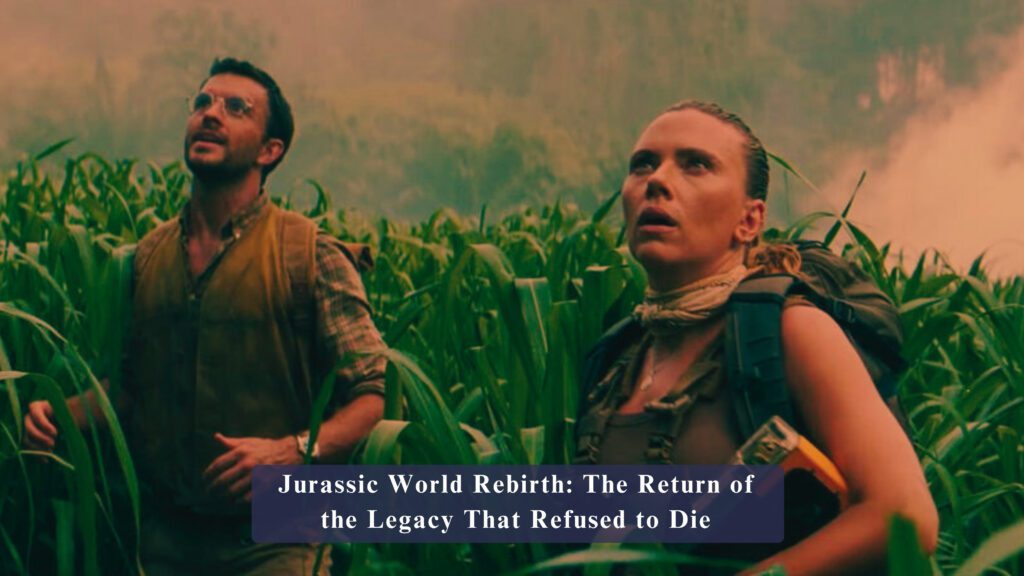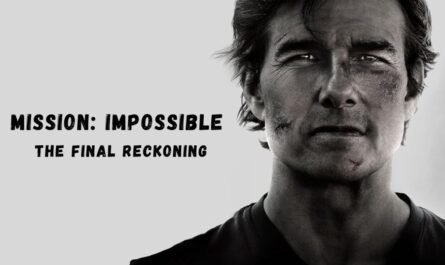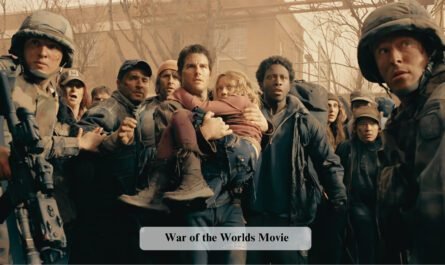Introduction: Jurassic World Rebirth — Why We Still Crave Dinosaurs
As a 25-year-old movie buff who practically grew up watching the awe-inspiring chaos of dinosaurs running amok, Jurassic World Rebirth hit me with a strange mix of nostalgia and dread. This wasn’t just a sequel; it felt like the franchise reclaiming its roar. After all the chaos in Jurassic World: Fallen Kingdom, who would’ve thought humanity would still try to play god?
But that’s exactly what Jurassic World Rebirth explores — the obsession with bringing dinosaurs back, the consequences of reckless science, and the heavy burden of legacy. In this blog, I’ll unpack how this film revives the heart of the franchise while warning us once again: life finds a way… and sometimes it finds a way to bite back.
1. Jurassic World Rebirth: The Park Reopens — A Risk Humanity Chose Again
One of the most controversial plot decisions in Jurassic World Rebirth is humanity’s insane choice to bring the park back — again. You’d think after Isla Nublar’s volcanic wipeout and the black market dinosaur auctions, the world would finally give it a rest.
But no. Jurassic World Rebirth reveals a secret global initiative: Project Eden. Backed by mega-conglomerates and powerful governments, Eden is designed to be a “controlled ecosystem,” one where dinosaurs are not just contained but studied and integrated into Earth’s biosphere. A controlled reboot, they say. But we know better.
Just like the original Jurassic Park, this decision is driven by greed, ego, and an almost spiritual hunger for domination over nature. The film portrays boardroom meetings with geneticists and corporate moguls debating whether ethics or profits matter more — guess which side wins?
The theme hits home: “Just because we can doesn’t mean we should.”
2. Jurassic World Rebirth: The Ethics of Playing God — Again
Another striking thread in Jurassic World Rebirth is its focus on bioethics. With Dr. Henry Wu returning, now older and visibly haunted by his past sins, the film gets into moral gray areas.
What’s truly chilling is how far the science has come. We’re not talking about basic cloning anymore — we’re talking about genome weaponization. Dinosaurs aren’t just reborn, they’re redesigned for defense, agriculture, and even warfare.
In the film, a chilling monologue from Wu includes the line:
“Evolution gave them millions of years. We gave them intelligence in just six months.”
This line isn’t just sci-fi—it’s a warning.
3. Jurassic World Rebirth: New DNA, New Dangers
Jurassic World Rebirth introduces us to genetically enhanced dinosaurs like the Velociraptor Rex Hybrid (Rexraptor) and ChameleoSaurus, a predator capable of full optical camouflage. These creatures are not natural. They’re lab-born nightmares.
One terrifying sequence involves a stealth hunt where the ChameleoSaurus hunts through infrared tracking and sound mimicry. A soldier hears his own commanding officer’s voice echoing in a cave—only to realize it’s the dinosaur mimicking him.
New DNA, new dangers—this isn’t just a catchy tagline, it’s the film’s central thesis. Science, unchecked, becomes a weapon.
4. Jurassic World Rebirth: Human-Dino Coexistence — A Failed Experiment
Remember the end of Fallen Kingdom, where dinosaurs were released into the wild? Jurassic World Rebirth takes that thread and rips it wide open. The world is now a patchwork of quarantined zones, and some countries are using dinos as tools.
The film shows footage of rural African villages where Triceratops are used for farming (yes, seriously), while in other regions, genetically engineered Allosaurs are being trained like military dogs.
The dark side? Massive casualties, black markets booming again, and ecosystems collapsing. Coexistence was a dream — and Jurassic World Rebirth shows why that dream is deadly.
5. Jurassic World Rebirth: Characters, Old and New
Bringing back legacy characters is a risky move, but Jurassic World Rebirth nails it.
Dr. Ian Malcolm returns as the voice of reason — sarcastic, cynical, and sadly always right.
Claire Dearing is now part of an underground eco-activist movement fighting against dinosaur exploitation.
Owen Grady has become a recluse — until he’s pulled back in for one last mission.
New faces include Dr. Miko Han, a young Japanese geneticist who begins to question the morality of her work, and Tyree, a dinosaur behaviorist who understands the animals better than the scientists who created them.
Character depth gives this movie soul. It’s not just about survival; it’s about redemption, guilt, and second chances.
6. Jurassic World Rebirth: Visuals That Stun and Terrify

Visually, Jurassic World Rebirth is a masterpiece. From neon-lit city chases with raptors in urban Tokyo to sweeping shots of dinosaur herds crossing African plains, the cinematography is breathtaking.
But it’s the horror elements that truly stand out. The Rexraptor isn’t just a predator; it’s a shadow. The camera lingers on empty spaces, making you feel like something is watching. These moments channel the dread of the original Jurassic Park.
Practical effects blend seamlessly with CGI, making the creatures feel more real than ever.
7. Jurassic World Rebirth: Soundtrack That Awakens the Wild
The music in Jurassic World Rebirth blends classic motifs from John Williams’ original score with tribal drums, eerie synths, and atmospheric tension. Composer Ramin Djawadi (of Game of Thrones fame) brings emotional weight and raw power to each scene.
In one unforgettable scene, as dinosaurs roam a snowy wasteland in Russia, a haunting melody plays — subtle, chilling, and beautiful. Music here doesn’t just accompany the action — it speaks to the tragedy of bringing the past into the future.
8. Jurassic World Rebirth: A Franchise That Grows With Its Fans
As a fan who grew up with this franchise, Jurassic World Rebirth feels like it respects the legacy while challenging it.
The movie isn’t just about dinosaurs anymore. It’s about humanity’s inability to learn, the obsession with control, and the price of unchecked ambition. It speaks to our current world—AI, cloning, environmental destruction. It uses dinosaurs to ask bigger questions.
This isn’t a movie made just for spectacle. It’s a warning, a mirror, and yes—a blockbuster thrill ride too.
9. Jurassic World Rebirth: Themes That Hit Hard
Some of the deeper themes that Jurassic World Rebirth tackles include:
Corporate exploitation of science
Environmental decay and species extinction
The illusion of control
Regret and personal responsibility
Legacy — and what we leave behind
These aren’t just background noise—they shape the film’s entire structure.
10. Jurassic World Rebirth: The Ending That Broke Me
Without giving away too much, the final act of Jurassic World Rebirth is haunting.
A choice is made — to either eradicate all engineered dinosaurs or let them inherit a world that humans are quickly destroying.
The choice is painful, divisive, and unforgettable. Tears are shed. Sacrifices are made. And once again, nature wins in a way no one expected.
I walked out of the theater emotionally wrecked but inspired. That’s what good sci-fi does.
Jurassic World Rebirth: Final Thoughts From a 25-Year-Old Fan
If you’re like me — someone who’s watched every installment, loved the thrills, feared the roars, and questioned the ethics — Jurassic World Rebirth is the movie we’ve been waiting for.
It isn’t perfect. It’s messy, complicated, and even overwhelming at times. But it’s brave. It evolves the franchise, respects its roots, and dares to ask hard questions.
And above all — it reminds us that no matter how far we advance, we are still children in the face of nature’s true power.
Love movies? Explore more in-depth blogs just like this — click here!




